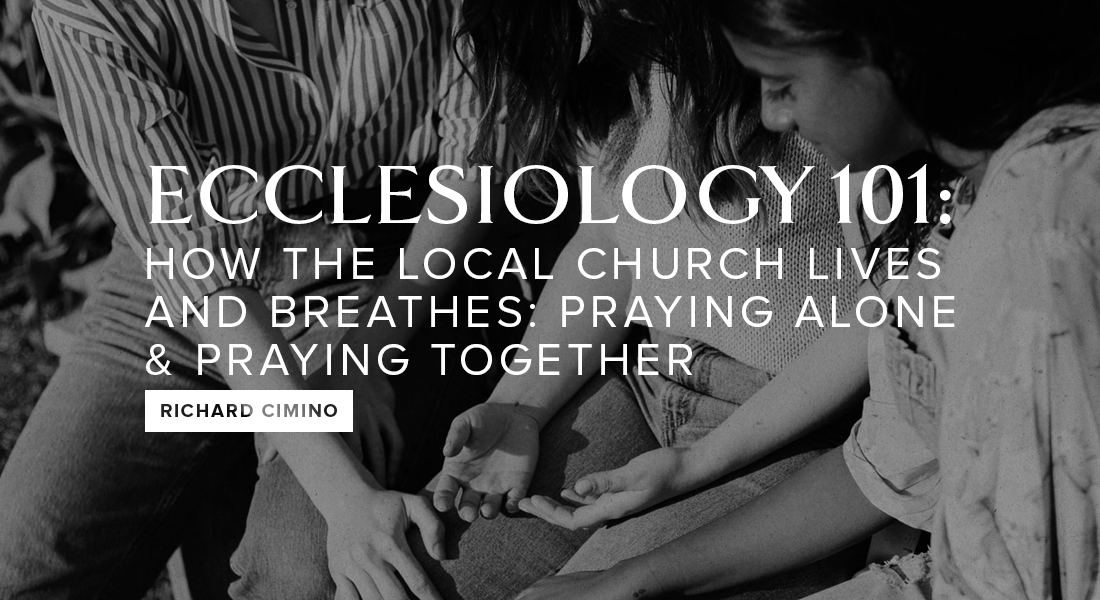
In this installment of Ecclesiology 101, we’re going to look at how the local church lives and breathes in relationship to prayer.*
Let’s start with this: I feel a great sense of lack in my own life when it comes to prayer. Not so much in regard to spontaneous, on the spot prayer, but in the realm of intentional, dedicated times of prayer. I am also coming to see that I have had an underdeveloped view of how important prayer is in the way Metro (and every local church) should live and breathe as a community. I’d like to ask you to raise your hand if you can identify with me on either of those two points.
Prayer in its essence is man talking with God. We find that prayer — men and women talking to God — occupies a huge chunk of real estate in the landscape of the Bible. We find the first conversation between man and God in the Book of Beginnings — Genesis (Genesis 3). The last words of the last book of the Bible are a prayer.
Cover to cover, the Bible is filled with different people, male and female, young and old, in different historical contexts, in different cultural contexts, in different personal contexts (rich, poor, sick, afraid, heartbroken, joyful, defeated, victorious, doubting, hopeful) talking to God. Scripture records prayer across the spectrum of history, and life tells us the place prayer should occupy in the spectrum of the individual believer’s life. But prayer isn’t intended to stop there. We have been saved from our kingdom of one — and saved to ekklesia. Prayer birthed in personal conversation with God should also connect us with the community of believers God has placed us in.
It’s my prayer that we will at least scratch the surface on what this can look like. But before we get to how we pray together, we need to start with how we pray alone.
PRAYING ALONE
Let’s start with what prayer is — Eugene Peterson made the observation that prayer is the use of human language to talk to God. It is using words to express to God what we sense and feel. It is using words to express our needs to God. It’s the use of words in responding to who God is, what God is doing, or what God has done.
If that is what prayer is, then the book of Psalms is God’s textbook on prayer.
Though the Psalms have much to say about God — each author prays (talks to God) in response to what they know about God. That is the prerequisite of prayer. What we know about God is the soil in which prayer grows.
The prayers recorded in the psalms begin with God. IN that same work, Peterson stated that the prayers of the psalms were not prayed by people trying to understand themselves or trying to diagnose and solve their predicament. Their human conditions might have provoked their prayers — but they were praying to the God who had revealed Himself to them in Scripture! They knew that God had invaded history — specifically the history of Israel. THAT was the soil in which their prayers and their prayer life were birthed and grew. For them, Peterson says:
“Prayer was not an upward wishing. They had a doctrine of God that prayer was rooted in. Though there was much they didn’t know about God (and there is much we don’t know about God) they knew with tremendous clarity some things about God that were absolutely true. Creation, Abrahamic Covenant, Exodus, salvation, the Mosaic commands. They knew that ‘God was not arbitrary or indifferent. They knew God couldn’t be manipulated.'”
When we read the psalms, we can’t miss the fact that those who penned their prayers and put them to song had taken the time to learn what God had revealed about Himself and then responded (prayed) in light of that revelation. Their circumstances were messy; their future was uncertain from their perspective, and quite often their heads and their hearts were murky waters. Most importantly, the soil of their prayer was not what they felt about God — it was what God had revealed about Himself.
“They went to their knees in a pool of light — an illuminating word, two words, maybe even a few sentences that revealed God to them, and by which they courageously decided to live by faith.”– Eugene Peterson
Guys — we have the canon of Scripture!
The psalms are the response of the human heart to the personal revelation of God in the face of every possible circumstance of life in a world that’s in the dark about God. THAT is what the psalms are. THAT is what prayer is. Their prayers were shaped and informed by God’s word, not their moods or their opinions about God.
How does the book of Psalms help us to pray alone?
“We are, in a sense, to put them inside our own prayers, or perhaps to put our prayers inside them, and approach God in that way. In doing this the psalms involve the speaker directly in new attitudes, commitments, promises, and even emotions. When, for example, we do not merely read Psalm 139:23–24—’search me . . . test me . . . see if there is any offensive way in me’—but pray it, we invite God to test our motives and we give active assent to the way of life called for by the Bible”– Timothy Keller1
“We don’t make up original prayers that suit our private spiritual genius. Prayer is not an original language, but a received language…. A millennium’s experience of grace and judgment, creation and chaos, guilt and salvation, rebellion and obedience shapes the prayers that are the Psalms. When we pray the Psalms and are trained in prayer by them, we enter into this centuries-long experience of being a people of God.”– Eugene Peterson2
FROM PRAYING ALONE TO PRAYING TOGETHER
In the psalms, we find personal prayers, born in specific, personal circumstances. They are the written form of the deepest, most personal communications with God.
The prayers of David are a great example of this.
“Psalm 3 A Psalm of David, when he fled from Absalom his son.
O Lord, how many are my foes! Many are rising against me; many are saying of my soul, ‘There is no salvation for him in God.’ Selah. But you, O Lord, are a shield about me, my glory, and the lifter of my head. I lay down and slept; I woke again, for the Lord sustained me. I will not be afraid of many thousands of people who have set themselves against me all around. Arise, O Lord! Save me, O my God! For you strike all my enemies on the cheek; you break the teeth of the wicked. Salvation belongs to the Lord; your blessing be on your people!” (Psalm 3).
“Psalm 34 of David, when he changed his behavior before Abimelech so that he drove him out, and he went away.
I will bless the Lord at all times; his praise shall continually be in my mouth. My soul makes its boast in the Lord; let the humble hear and be glad. Oh, magnify the Lord with me, and let us exalt his name together! I sought the Lord, and he answered me and delivered me from all my fears. Those who look to him are radiant, and their faces shall never be ashamed. This poor man cried, and the Lord heard him and saved him out of all his troubles. The angel of the Lord encamps around those who fear him, and delivers them. Oh, taste and see that the Lord is good! Blessed is the man who takes refuge in him!” (Psalm 34:1-8).
“Psalm 51, A Psalm of David, when Nathan the prophet went to him after he had gone into Bathsheba.”
They held back nothing from in those intense, personal moments of prayer. By inspiration of the Holy Spirit, they recorded what they spoke to God and how they spoke to God, wrong attitudes, flawed passions and all.
But what they PRAYED ALONE was also intended to be PRAYED TOGETHER
David clearly intended Psalm 3 to be read and prayed in community.
“I cried aloud to the Lord, and he answered me from his holy hill. Selah. Salvation belongs to the Lord; your blessing be on your people! Selah” (Psalm 3:4).
David intended Psalm 34 to be prayed in community.
“Oh, fear the Lord, you his saints, for those who fear him have no lack! Come, O children, listen to me; I will teach you the fear of the Lord. What man is there who desires life and loves many days, that he may see good?” (Psalm 3:9-12)
David intended that radical, intensely personal and brutally honest prayer of Psalm 51 to be sung in community. The full title of Psalm 51 is “To the choirmaster. A Psalm of David, when Nathan the prophet went to him after he had gone into Bathsheba.”
In our next installment, we’ll examine what that looks like in the community of 21st century Christians.
* Enjoy the complete series on Ecclesiology 101!
Notes:
1 Timothy Keller and Kathy Keller. The Songs of Jesus: a Year of Daily Devotions in the Psalms. New York: Viking, 2015.
2 Eugene H. Peterson. Answering God: The Psalms as Tools for Prayer. San Francisco: Harper San Francisco, 1991.






